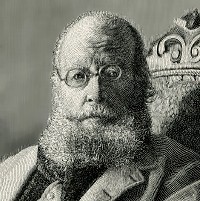Edward Lear byl anglický ilustrátor a spisovatel, který proslul svými nonsensovými básněmi a tzv. „limeriky“ .
Narodil se v Highgate v Londýně jako předposlední dvacátý potomek zámožného makléře, a byl vychováván o 21 let starší sestrou Annou. Trpěl od mládí nepevným zdravím, od sedmi let měl záchvaty epilepsie, potíže dýchacích cest, na sklonku života částečně oslepl. Po otcově obchodním krachu se v patnácti musel se sestrou odstěhovat z domova. Sám se nikdy neoženil a vlastní děti neměl.
V devatenácti letech vydal knihu přírodopisných kreseb papoušků. Přes svůj trvající zájem a snahu o přírodopisné ilustrace se proslavil spíše jako spisovatel knížek pro děti. Ve dvaceti čtyřech letech mu vyšla jeho Velká kniha nesmyslů , sbírka limeriků, jež tuto krátkou básnickou formu proslavila. Celkem limeriků napsal přes dvě stě. Další známá básnická díla jsou Sedm rodin od jezera Piplpopl a báseň Sova a Kočička , kterou napsal pro děti svého mecenáše.
Do češtiny se zapsal hlavně díky překladům Antonína Přidala, Kniha třesků a plesků , Velká kniha nesmyslů , viz například následující limerik:
Byl jeden dědeček v Szegedu,
který jel na starém medvědu.
Když se ptali: „Kluše?“
Odpověděl suše:
„Je z rodu neklusavých medvědů.“Naposledy vyšel v roce 2004 v překladu Jana Vladislava Třesky, plesky, česky .
Wikipedia
✵
12. květen 1812 – 29. leden 1888
